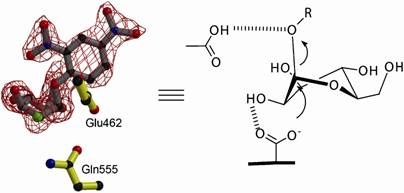Berkeley scientists discover inexpensive metal catalyst for generating hydrogen from water
Advertisement
hydrogen would command a key role in future renewable energy technologies, experts agree, if a relatively cheap, efficient and carbon-neutral means of producing it can be developed. An important step towards this elusive goal has been taken by a team of researchers with the U.S. Department of Energy's (DOE) Lawrence Berkeley National Laboratory and the University of California, Berkeley. The team has discovered an inexpensive metal catalyst that can effectively generate hydrogen gas from water.
"Our new proton reduction catalyst is based on a molybdenum-oxo metal complex that is about 70 times cheaper than platinum, today's most widely used metal catalyst for splitting the water molecule," said Hemamala Karunadasa, one of the co-discoverers of this complex. "In addition, our catalyst does not require organic additives, and can operate in neutral water, even if it is dirty, and can operate in sea water, the most abundant source of hydrogen on earth and a natural electrolyte. These qualities make our catalyst ideal for renewable energy and sustainable chemistry."
Karunadasa holds joint appointments with Berkeley Lab's Chemical Sciences Division and UC Berkeley's Chemistry Department. She is the lead author of a paper describing this work that appears in Nature, titled "A molecular molybdenum-oxo catalyst for generating hydrogen from water." Co-authors of this paper were Christopher Chang and Jeffrey Long, who also hold joint appointments with Berkeley Lab and UC Berkeley. Chang, in addition, is also an investigator with the Howard Hughes Medical Institute (HHMI).
Nature has developed extremely efficient water-splitting enzymes – called hydrogenases – for use by plants during photosynthesis, however, these enzymes are highly unstable and easily deactivated when removed from their native environment. Human activities demand a stable metal catalyst that can operate under non-biological settings. Metal catalysts are commercially available, but they are low valence precious metals whose high costs make their widespread use prohibitive. For example, platinum, the best of them, costs some $2,000 an ounce.
"The basic scientific challenge has been to create earth-abundant molecular systems that produce hydrogen from water with high catalytic activity and stability," Chang says. "We believe our discovery of a molecular molybdenum-oxo catalyst for generating hydrogen from water without the use of additional acids or organic co-solvents establishes a new chemical paradigm for creating reduction catalysts that are highly active and robust in aqueous media."
The molybdenum-oxo complex that Karunadasa, Chang and Long discovered is a high valence metal with the chemical name of (PY5Me2)Mo-oxo. In their studies, the research team found that this complex catalyzes the generation of hydrogen from neutral buffered water or even sea water with a turnover frequency of 2.4 moles of hydrogen per mole of catalyst per second.
Long says, "This metal-oxo complex represents a distinct molecular motif for reduction catalysis that has high activity and stability in water. We are now focused on modifying the PY5Me ligand portion of the complex and investigating other metal complexes based on similar ligand platforms to further facilitate electrical charge-driven as well as light-driven catalytic processes. Our particular emphasis is on chemistry relevant to sustainable energy cycles."
Other news from the department science
Most read news
More news from our other portals
See the theme worlds for related content
Topic world Synthesis
Chemical synthesis is at the heart of modern chemistry and enables the targeted production of molecules with specific properties. By combining starting materials in defined reaction conditions, chemists can create a wide range of compounds, from simple molecules to complex active ingredients.

Topic world Synthesis
Chemical synthesis is at the heart of modern chemistry and enables the targeted production of molecules with specific properties. By combining starting materials in defined reaction conditions, chemists can create a wide range of compounds, from simple molecules to complex active ingredients.
































































